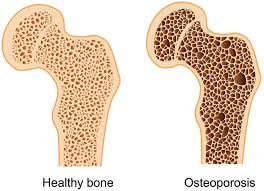Dr Camilla Cameron
BONE HEALTH – PREVENTION AND TREATMENT OF OSTEOPOROSIS
Did you know that peak bone mass, or bone density, is reached at around the age of 30? This peak bone mass is built through nutritional support (through diet and or supplementation) and weight bearing exercise from an early age. The more a child moves and participates in exercise, the more likely it is that they will reach an optimum peak bone mass. From around the age of 35 onwards, bone resorption begins to exceed bone formation. Bone density loss is usually around 0.3%-0.5% each year from this age onward.
Men generally have a higher peak bone mass than women, this is due to the fact that they generally have larger bones. This means that men tend to be at a lower risk of Osteoporosis than women. Menopause, and its resulting reduction of estrogen, also may lead to loss of bone mass in women.
There are many factors with could promote your risk of developing Osteoporosis, these include:
- Genetics: if you have a history of Osteoporosis in your family your risk is increased.
- Being female.
- Being of Caucasian or Asian decent.
- A lack of exercise, calcium in your diet or Vitamin D (sun exposure and sometimes an inability to absorb Vitamin D).
- History of fracture as an adult.
- Smoking.
- Excessive consumption of alcohol or caffeine.
- History of inflammation such Rheumatoid Arthritis and Crohn’s Disease.
- Low estrogen in women.
- Low testosterone in men.
- Amenorrhea (or loss of period) in young women due to excessive exercise or Anorexia Nervosa.
- Hyperthyroidism or Hyperparathyroidism.
The good news is that you can help promote bone density through various means:
- Take a good quality calcium supplement daily
- Undertake weight bearing exercise for at least 30 mins, 3-5 times a week.
- If you smoke, you must stop.
- Consume Alcohol moderately.
- Try to get some form of sunlight daily.
DISCLAIMER: THIS WEBSITE DOES NOT PROVIDE MEDICAL ADVICE
The information, including but not limited to, text, graphics, images and other material contained on this website are for informational purposes only. No material on this site is intended to be a substitute for professional medical advice, diagnosis or treatment. Always seek the advice of your physician or other qualified health care provider with any questions you may have regarding a medical condition or treatment and before undertaking a new health care regimen, and never disregard professional medical advice or delay in seeking it because of something you have read on this website.




